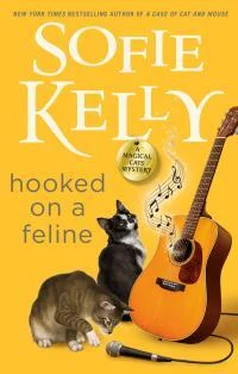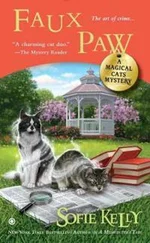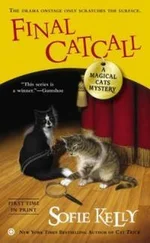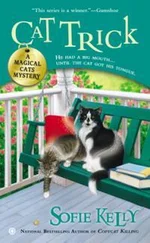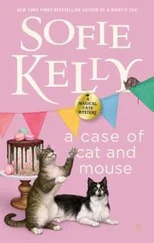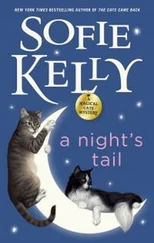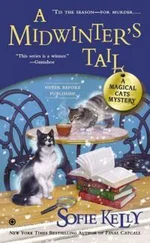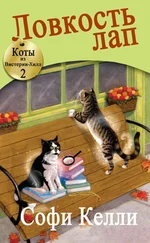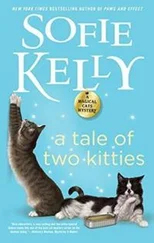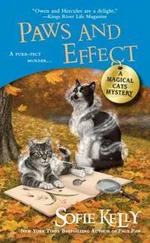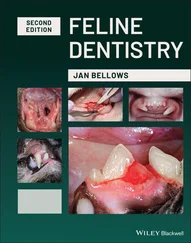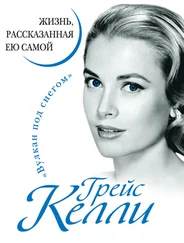I nodded. “Actually the credit should go to Abigail. She remembered some documents that seem to be from some kind of accounting of people in this part of the state. We did a little digging and found them. They predate the first Minnesota Territorial Census of 1849 by a year. They might help you learn more about your great-great-grandfather’s family.”
“You’re serious?”
I nodded. “The paper is very fragile and you’ll need a magnifier and some patience to read the names.”
“I thought I was at a dead end. This could be exactly what I’ve been looking for.” Going on the road with Johnny seemed to be forgotten—at least for now. Mike gave me a saucy grin. “Kathleen, I would bow down and kiss your hand if your very large police-detective boyfriend weren’t just over there talking to my cousin.”
“How about you bring me coffee next time you come to the library instead?”
“Done!” he said. “And that will be Monday—probably afternoon if that’s okay? I took the week off.”
“It’s fine with me. Abigail will be there and so will I.”
Nic was behind the counter. He held out a hand and I gave him my mug. He refilled it and handed it back. “Thank you,” I said.
Mike and I headed back to the others. “Hey, I really owe you a big thank-you for all the help you’ve given me while I’ve been researching the family,” he said. “It turned out to be a much bigger project than I ever expected.”
“It’s part of my job,” I said. “And I’ve found the whole thing fascinating.” I took a sip of my coffee. “I had no idea your great-aunt, Leitha, went to college at sixteen, let alone learned to fly as part of the War Training Service. And she knew John Glenn.”
“Yeah, that surprised me as well. She rarely talked about that part of her life.” He pulled his fingers through his hair. “You know, Aunt Leitha is the reason I started researching the Finnamore family history.”
I shook my head. “I didn’t.”
“Before she died she was taking part in a long-term study into heart disease.”
“I did know that.”
Leitha Finnamore Anderson had outlived her brother, her two nieces and a great-nephew. With the exception of the great-nephew, all had died from cardiac issues. Leitha herself had been ninety-three when her car went off the road this past spring. She had died as a result of her injuries. Researchers wanted to know why Leitha—and people like her—lived so long and were physically and mentally in such good shape. Was it genetics? Was it lifestyle? Was it both? Or neither? And was there any connection with other traits such as eye color or height?
Mike made a face. “Like I said, there were things she never talked about, and once she was gone, I was sorry I didn’t push more. I felt this urgency to learn about the family while there were still people left to talk to.” He held up a finger as though something had just occurred to him. “That reminds me, Kathleen: At some point I’d like to have a family tree drawn out. Isn’t there a guy at the artists’ co-op who does that sort of thing?”
“You’re probably thinking about Ray Nightingale,” I said.
Ray was best known for his intricate pen-and-ink drawings, which each featured a tiny fedora-wearing duck named Bo somewhere in the design. Ray had also drawn several family trees for different people—in one case drawing a very detailed actual tree to showcase that family’s connections.
Mike snapped his fingers. “Nightingale. Right. That’s the guy I was thinking of.”
“I’m sorry. Ray isn’t in town anymore.” I held up one hand before he could speak. “But I know someone who should be able to help you.” I gestured at Maggie, who was deep in conversation with Johnny. “Do you know Maggie Adams?”
“The yoga teacher?”
“Uh-huh. And she’s also a very talented artist.”
Mike had already started to nod. “Wait a second. Did she make that mannequin thing of Eddie a few years back for Winterfest?”
I nodded. “Yes, she did.” The “mannequin thing of Eddie” had been responsible for Eddie and Roma ending up together.
“You think she could make what I’m looking for?”
“I do. But if she couldn’t, or if she doesn’t have time in her schedule, Maggie could put you in touch with another artist who could help you. She used to be the president of the artists’ co-op.”
“Fantastic,” Mike said. “Introduce me.”
We joined Maggie and Johnny and I made the introductions, explaining to Mags what Mike was looking for.
“Off the top of my head, I can come up with a couple of ways to go,” she said. “You could go very minimalist, with a clean, simple design, and focus on the fonts and the paper. Or you could take the completely opposite tack and do something very detailed. What were you thinking of?”
I knew that gleam in her eye. She was interested.
Mike shrugged. “I don’t know. Something more than just names on a piece of paper. Something that could be framed and hung on the wall.”
“You know that all you’re going to find in the family tree are brigands and reprobates,” a voice said behind us.
I turned to find Jonas Quinn—Mike’s cousin—and Jonas’s nephew, Lachlan, grinning at us. I knew Jonas from the library. He was an avid reader of military history and “hard” science fiction and lately books on genetics, which made sense since Mike was digging into the family history. He was about the same height as Marcus, which meant he was just over six feet, and he had dark eyes and wavy dark hair cut much shorter than Mike’s. Jonas was a college professor and Lachlan’s guardian.
I knew Lachlan because he’d come to the library with Mike more than once. He was seventeen and a nice kid. He had the same thick hair as Mike and Jonas did, except his was long, pulled back into a ponytail. “A tangle of curls,” I remembered Mary calling it.
“As you can probably tell, my cousin is not interested in our past,” Mike said dryly.
“That’s true.” Jonas nudged his black brow-line glasses up his nose. “I’m looking to the future, which is Lachlan.”
“Geez, no pressure,” the teen said. I saw the gleam in his green eyes and knew he wasn’t really feeling pressured.
“Lachlan wants to study music,” Mike said.
“What’s your dream school?” I asked.
Lachlan smiled. “Berklee,” he said. “But I know how hard it is to get in, so I’m applying to other places as well. I want to be an audio engineer and music producer.”
“He plays piano, guitar and bass,” Jonas said.
I knew that Lachlan’s father was Jonas Quinn’s younger brother. Jonas had taken on raising the boy when his parents died as the result of a car accident. I could hear the parental pride in his voice.
“He’s good,” Johnny added. “I’m running out of things to teach him.”
Lachlan ducked his head as a flush of color crept up his neck.
“I think you’d like Boston,” I said as a way of changing the subject. “There’s an incredible amount of music to see live. Whatever kind of music you like, someone somewhere in the city is playing it.”
“That’s where you grew up, right?” Lachlan asked.
I took a sip of my coffee. It had gotten cold. “For the most part. My family still lives there.”
Maggie leaned into my line of vision. “Kath, you should connect him with Ethan,” she said.
I nodded. “That’s a good idea.” I turned my attention to Lachlan again. “My younger brother, Ethan, is a musician. He could tell you all about the music scene in Boston, and a friend of his went to Berklee. Ethan teaches music and he has a band called The Flaming Gerbils.”
Lachlan frowned. “Wait a sec. The lead singer? That’s your brother? Ritchie played me a couple of their songs. They’re really good. Man, I’d love to talk to him.”
Читать дальше
